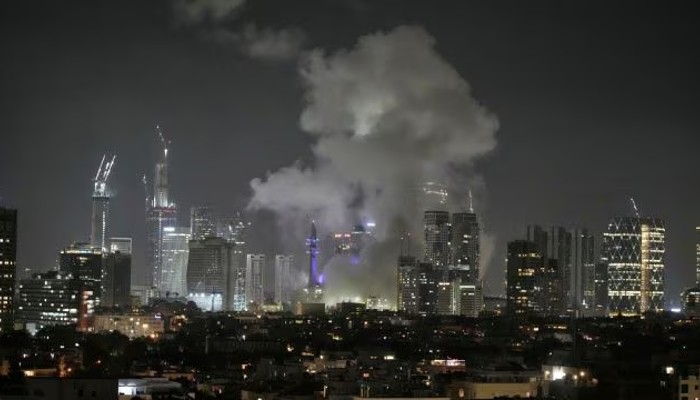Release of former Indian Navy officers by Qatar: Much more than a mere diplomatic win for India

Prime Minister Narendra Modi with Qatar’s Emir Tamim bin Hamad Al Thani in Doha on February 15, 2024.
India’s relations with Gulf countries have undergone a monumental change in recent years
Eight Indian naval officers were freed from custody in Qatar, a little over three months after being sentenced to death. Seven have since returned to India. Not much was known about the nature of charges leading to their arrest and sentencing, except that they were accused of spying for Israel, a declared enemy of Qatar. At the time of their incarceration these eight were working, in their private capacity, for a currently defunct Oman based company, Dahra global. Their task was to oversee the training of Qatar naval personnel.
They were arrested in August 2022 and sentenced to death in October last year, remaining most of this period in solitary confinement. Throughout the trial, the Indian mission in Doha backed the officers and provided all legal assistance. The Indian Prime Minister even met the Emir of Qatar on the sidelines of the COP28 summit in Dubai on December 1, 2024. Prime Minister Narendra Modi tweeted, “We had a good conversation on the potential of bilateral partnership and the well-being of the Indian community in Qatar.” Evidently, their case would have been on the agenda. Subsequently on December 28, 2024, their death sentence was converted to varying prison terms.
Their release came without any prior announcement as also with legal appeals pending. The Ministry of External Affairs (MEA) statement on the release, issued on February 12, 2024, read, “We appreciate the decision by the Emir of the State of Qatar to enable the release and home-coming of these nationals.” India employed its diplomatic leverage all through, while avoiding criticizing Qatar or its judicial system.
Most of what transpired between governments from the time of their arrest, sentencing and release remains shrouded in mystery, except that they were high-level engagements between the two countries involving the National Security Advisor (NSA), External Affairs Minister (EAM), the Prime Minister and also possibly others who have linkages with both nations. The NSA and EAM made multiple visits to Doha and also interacted with their counterparts in global forums.
The PM visited Qatar on his return from Abu Dhabi, most likely to thank the Emir of Qatar, Tamim bin Hamad Al Thani. Qatar, as a nation, has been in the limelight in recent times. It hosted talks between the Taliban (who had established their first international office in Doha in 2013) and the US, paving the way for US withdrawal. It was the first Arab state to host a FIFA world cup, which it did in November-December 2022. Currently, it is brokering talks between Hamas and the west seeking to bring about a truce in Gaza. Both the Taliban and Hamas have their presence in Doha.
It hosts the US’s largest air base in the Middle East at Al Udeid, while a US Army contingent is stationed at Al Sayliyah, providing the US some leverage over the Qatari leadership.
In 2017, Arab nations, including Saudi Arabia, UAE, Egypt and Bahrain, broke diplomatic ties with Doha accusing it of ‘destabilizing the region with its support for Islamist groups.’ Their anger stemmed from Qatar’s ties with Iran, then an enemy of Gulf states. Ties were restored in January 2021. Throughout the blockade by Arab states, it was Tehran which provided food shipments to Qatar. Doha’s al Jazeera news network plays a role of a global influencer, while trying to project a neutral image.
In February last year, India and Qatar celebrated 50 years of establishment of full diplomatic relations. As per the MEA, India's bilateral trade with Qatar in 2021-22 was USD 15.03 billion. Estimates mention that Qatar is the world’s sixth-largest dry natural gas producer, second-largest Liquefied Natural Gas (LNG) exporter, and the third-largest holder of natural gas reserves.
A few days ago, India inked a USD 78 Billion LNG deal with Qatar extending the current pact by another 20 years till 2048. The ongoing agreement is valid till 2028. The new rates are lower than current prices and India would save USD 6 Billion over the contract period. Many claim that this deal was behind the release of the naval personnel. This is unlikely as the deal benefits both nations and is not skewed in Qatar’s favour.
Amongst nations which India would have tapped to help convince Qatar on releasing its veterans are Italy, the US, Iran, Oman, Saudi Arabia and the UAE. All these nations have close ties with both nations. Italy is currently manufacturing midget submarines for Qatar, whose data was presumed to have been leaked to Israel, allegedly by the arrested naval officers. India had been insisting that the case was politically motivated. The fact that India continued to push, employing every avenue it could exploit, finally paid off.
India’s relations with Gulf countries have also undergone a monumental change in recent years. India, which had always viewed the region through the prism of Pakistan and Islam, ignored the fact that it has the largest Indian diaspora. The change in Indo-Gulf ties have placed Pakistan on the backfoot. It has been the most shocked nation by the release, refusing to comment.
The growing India-Gulf relationship currently involves military-to-military contacts including joint exercises, which were never the norm earlier. In December 2020, the Indian army chief, General Naravane, made a first-ever visit to the Gulf. Cooperation in counter-terrorism, intelligence sharing and cyber security have boosted security ties. Many nations of the region procure Indian defence equipment as also agreements for joint development of defence products are being inked.
The Gulf is no longer only dependent on oil for their growth. They have begun investments in other sectors. What better place than India. Saudi Arabia is the 19th largest investor in India with FDI valued at USD 3.2 Billion. The sovereign wealth fund of Qatar has investments in many Indian companies including Adani Green, Adani Transmission, Reliance Retail etc. Similar is the story of other nations from the region. These have provided a boost to ties.
The PM has personally invested in enhancing ties with heads of state of Gulf countries. He has visited the Gulf 15 times since 2014. This has changed the texture of India’s ties with the region. Simultaneously has been the growth of India’s global standing. India is amongst few nations which have been able to pull its citizens out from most dangerous trouble spots including Afghanistan, Ukraine, Sudan, Yemen, Syria etc.
The world has accepted India’s independent viewpoint in global crises, possibly grudgingly, but nonetheless. This carries weight when Indian diplomacy moves to secure its citizens trapped in trouble spots or on political charges.
Within the country, the government was mocked on the arrest and sentencing of naval officers by the opposition including in parliament. The government, refusing to comment on the subject or criticizing Qatar, promised all support. EAM S Jaishankar, on meeting the families, assured their safe return, adding to confidence in the ability of the government.
What has been the icing on the cake has been that Qatar released the naval personnel despite their appeals pending and being accused of spying, a rarity in global circles. It could not have been without immense effort, coordination and exploitation of India’s global stature. With the release, the government has once again displayed that India will protect its citizens across the globe.
*** The writer is a security and strategic affairs commentator; views expressed are his own

Israel-Iran Conflict Escalates: Missiles Exchanged Amidst Mossad-Led Strikes
Tensions soar as Israel and Iran exchange missile strikes. Israel targets nuclear sites, Iran retaliates with ballistic missile barrage, raising war fears.
| 2025-06-14

Iran Summons UK Diplomat Over Arrests of Nationals in Terror Probes
Iran protests UK arrests of its nationals over terror charges, calling the move baseless and politically motivated. Three Iranians face national security charges.
| 2025-05-19

India and Iran Discuss Chabahar Port Amid Regional Tensions
India’s NSA Ajit Doval and Iran’s Ali Akbar Ahmadian discussed expanding cooperation on the Chabahar port and regional stability amid India-Pakistan tensions.
| 2025-05-19

Qatar Airways Profit Surges 28% to $2.1 Billion on Global Expansion
Qatar Airways reports a record $2.1 billion profit, driven by international investments and a landmark aircraft and engine deal with Boeing and GE Aerospace.
| 2025-05-19

Haj Flights Resume Between Saudi Arabia and Iran After Eight-Year Pause
Flynas restarts haj flights from Iran for the first time since 2015, signalling improved Saudi-Iran relations after a Chinese-brokered deal in 2023.
| 2025-05-19




